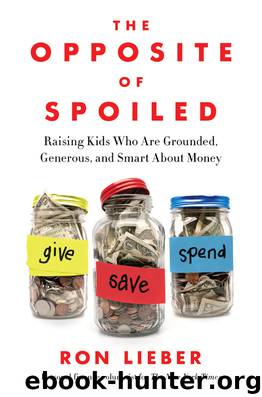The Opposite of Spoiled by Ron Lieber

Author:Ron Lieber
Language: eng
Format: epub
Publisher: HarperCollinsPublishers
Published: 2014-12-15T05:00:00+00:00
The Homeless Question and How to Handle It
As with many of the most important money conversations, it can be hard to find the right moment to introduce the giving topic. Kids, however, will make up their own minds on timing, and it’s often when something right before their eyes is confusing or troubling.
One autumn afternoon in 1991, a playwright named Teddy Gross was walking in Manhattan when his 4-year-old daughter Nora spotted a homeless man. He had newspapers wadded in his shoes to protect his feet from the elements, and he was sitting on a busy sidewalk leaning up against a newsstand. Gross wasn’t in the habit of giving money to panhandlers and didn’t even see the man at first. But his daughter spotted him and sized him up, and the man smiled at her. And while the family had never had a conversation about homeless people before, Nora knew just what the man’s problem was and how best to solve it. So she turned to her father and asked him a question.
“Can we take him home?”
Most of us who live near homeless people or regularly pass through or visit places where they ask for money have been in this spot, even if our own children’s questions were a little different. A child might ask why we give money to strangers who ask for it. Or, alternatively, they demand to know why we don’t. They may also want to know why homeless people have no place to live or whether it’s their fault or their choice. For parents, these moments tend to be ones of hyperconsciousness and wildly mixed feelings. There is pride in the fact that a child recognizes the humanity of others and is moved to act. Shame if we don’t give ourselves or if we turn away. Anger or fear if a panhandler is aggressive or scares our children. Frustration with a society where people live on the streets. And, perhaps most of all, there’s confusion about the best way to explain the complicated answers and all our feelings about them to kids of varying ages.
It would have been easy enough for Teddy to brush off his daughter’s question or treat it as a rhetorical one. He could have lied and said no, even though it was certainly possible to take the man back to their apartment for a meal or a shower or a few nights on their sofa. He could have told the truth and said yes—but then explained that it was risky because homeless people are sometimes mentally ill and can behave unpredictably. He could have ducked the question, telling her that her idea was a really nice one and that they could talk about it later.
But none of those answers would have been very satisfying. “Children’s early years are characterized by a compulsion to find out, a strong urge to both map out and transform reality,” according to Susan Engel, a senior lecturer in psychology at Williams College and an expert on curiosity.
Download
This site does not store any files on its server. We only index and link to content provided by other sites. Please contact the content providers to delete copyright contents if any and email us, we'll remove relevant links or contents immediately.
The Lost Art of Listening by Michael P. Nichols(7506)
Rich Dad Poor Dad by Robert T. Kiyosaki(6633)
We Need to Talk by Celeste Headlee(5615)
I Love You But I Don't Trust You by Mira Kirshenbaum(3876)
The Complete Idiot's Guide to Coping With Difficult People by Arlene Uhl(3149)
Rich Dad Poor Dad: What The Rich Teach Their Kids About Money - That The Poor And Middle Class Do Not! by Robert T. Kiyosaki(2958)
A Burst of Light by Audre Lorde(2607)
The Book You Wish Your Parents Had Read (and Your Children Will Be Glad That You Did) by Philippa Perry(2528)
Dealing with People You Can't Stand by Dr. Rick Brinkman(2460)
Life Hacks by Dan Marshall(2456)
An Odyssey by Daniel Mendelsohn(2309)
The Expectant Father by Armin A. Brott & Jennifer Ash(2273)
Teach Your Child How to Think by Edward De Bono(2159)
No Time to Say Goodbye(2118)
What I Need by J. Daniels(2082)
The 7 Habits Of Highly Effective Teens by Covey Sean(2080)
The Out-of-Sync Child by Carol Stock Kranowitz(2055)
The Anxious Generation by Jonathan Haidt(2051)
I Don't Belong to You by Keke Palmer(2005)
